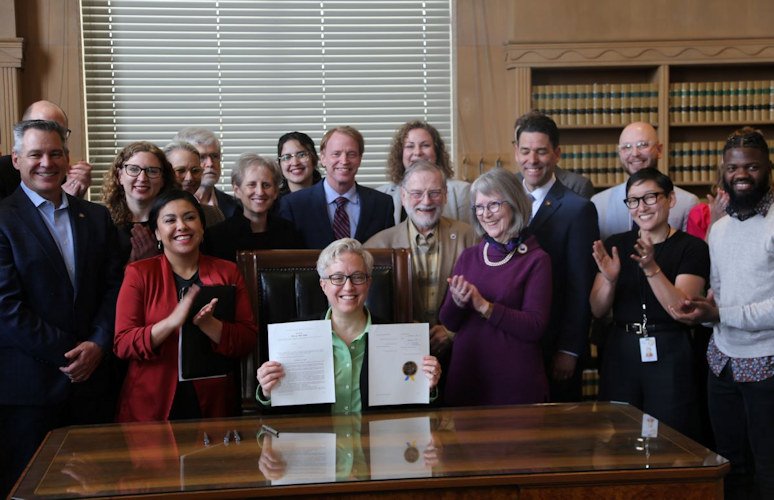Gov. Kotek signs ‘historic’ bill setting limits on candidate campaign contributions, starting in 2027

SALEM, Ore. (KGW/KTVZ) -- Oregon Gov. Tina Kotek signed House Bill 4024 at a ceremony on Wednesday afternoon, officially enacting a large-scale campaign finance reform package that will place upper limits on donations to political candidates starting in January 2027 and create new disclosure rules for political transactions.
“Often, the word ‘historic’ can feel overused. But I know for a fact that there were many people – including myself at times – who thought getting campaign contribution limits through the legislature would never happen,” Kotek said.
“But we are here today to acknowledge and celebrate the efforts that have led to House Bill 4024 in this year’s legislative session, bringing Oregon into the company of 45 other states that have campaign contribution limits.”
Campaign finance reform has been a long-simmering topic in Oregon, which until now has been one of the few remaining states in the country with no limits on the amount of money that campaigns can get, or who that money can come from.
Oregon voters have put limits in place multiple times through ballot initiatives, only to see them undone after the fact. After a 1995 initiative was challenged in court, the Oregon Supreme Court ruled that the limits violated the right to free speech enshrined in the state Constitution.
An initial attempt to change the Constitution failed at the ballot box in 2006, but Oregon voters passed a new constitutional amendment in 2020, opening the door to campaign finance limits. Advocates launched three ballot initiatives to put limits in place in the 2022 election, but they were all shot down on technical grounds.
The legislative overhaul was one of the biggest items to emerge from this year's short session, spurred in part by the possibility of a new voter initiative making on the ballot in November. The bipartisan compromise that emerged from the House Rules Committee and ultimately passed both the House and Senate by wide margins.
"We set out to find a compromise because the alternative was an expensive and potentially confusing fight at the ballot — as well as years of legal challenges. Thankfully, everyone involved came to the table in good faith, and I'm grateful for their hard work. HB 4024 truly represents the Oregon Way of getting things done," House Speaker Julie Fahey said in a statement.
The law sets an upper limit of $3,300 for donations from individuals to candidates in statewide races, putting an end to the kind of large-scale donations that statewide candidates have received in recent years, such as Nike co-founder Phil Knight's seven-figure contributions to unaffiliated candidate Betsy Johnson and Republican candidate Christine Drazan in the 2022 governor's race.
It also places limits on donations from businesses, advocacy groups and nonprofits to candidates in statewide races, so contributions like the $1.7 million that Kotek received from the Service Employees International Union would also be prohibited. Local governments will be able to set their own limits for local elections.
--
Joint news release from Oregon Senate and House Democratic and Republican offices:
Historic Campaign Finance Reform Bill Signed Into Law
This is the first time in decades that Oregon will meaningfully cap campaign donations, limits to take effect in 2027
SALEM, Ore. - Today, House Bill 4024 was signed into law, protecting Oregonians’ voices and taking steps to get big money out of politics by setting meaningful limits on campaign contributions. During a bill signing ceremony hosted by Governor Kotek, lawmakers and advocates celebrated the historic moment and acknowledged the many years of work on campaign finance reform that paved the way for this year’s success.
This bipartisan effort was led by then-House Majority Leader Julie Fahey and House Republican Leader Jeff Helfrich in partnership with a variety of stakeholders.
“We set out to find a compromise because the alternative was an expensive and potentially confusing fight at the ballot--as well as years of legal challenges. Thankfully, everyone involved came to the table in good faith, and I'm grateful for their hard work. HB 4024 truly represents the Oregon Way of getting things done,” said House Speaker Julie Fahey (D-Eugene).
“Oregonians expect fairness and transparency in their elections. This bipartisan bill takes great strides to achieve more of both. Republicans remain committed to uncoupling power from insiders and returning it to the people of our great state,” said House Republican Leader Jeff Helfrich (R-Hood River).
“These are needed reforms that safeguard our elections, while protecting the ability of community organizations and nonprofits to engage in the kind of grassroots political organization that is a hallmark of Oregon’s democracy,” said Senate Democratic Leader Kate Lieber (D-Beaverton & SW Portland).
“The people of Oregon have spoken on this issue and want reasonable campaign finance reform. It’s been a policy in the making for many years, and I am proud of all the voices who came together to finally make it happen. It will be great to see my constitutional amendment which was passed by the voters be implemented,” said Senate Republican Leader Tim Knopp (R-Bend).
State agencies overseeing elections and campaign finance in Oregon will now work to implement the law so that it can go into effect smoothly in 2027.



